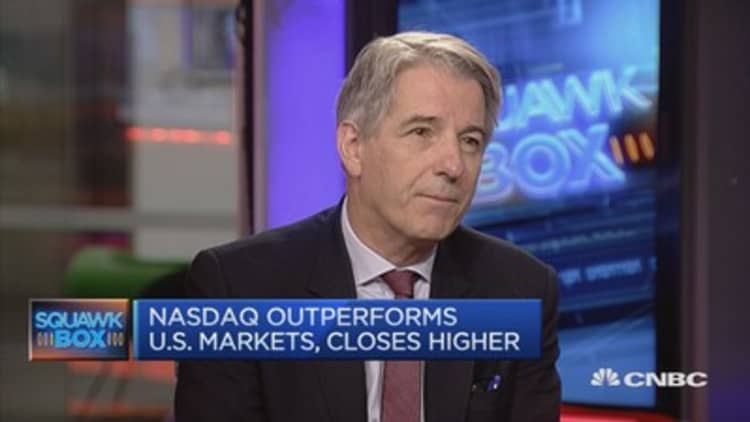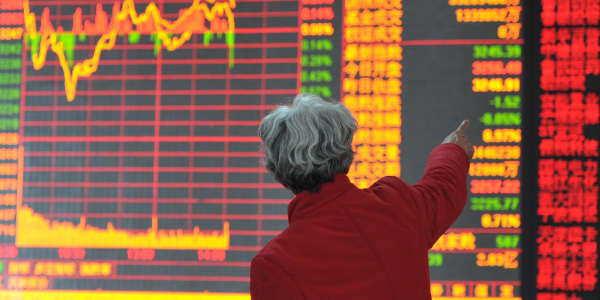
Treasury Secretary Steve Mnuchin debuted what could be called the fiscal policy version of Trump foreign policy this week — in a matter of just a few days, Mnuchin did an about-face on a major position. The Treasury Secretary went from telling the Financial Times that Trump's tax-reform timeline was "highly aggressive to not realistic at this point" to telling everyone a few days later the Trump administration was "pretty close" to bringing forward major tax reform.
That was welcome news to the market — it rallied after Mnuchin's time travel on Thursday — but markets don't typically thrive on uncertainty. Most investors prefer not to be treated like geopolitical foes intentionally kept on their toes, possibly with the exception of Wall Street high-frequency trading algorithms. On Friday afternoon, President Trump said he would release a tax reform package next week and it would be bigger than "any tax cut ever." But Trump seemed to waver on the timing, with the White House issuing a subsequent statement saying, "The President was saying what we've been saying all along, that he wants to do tax reform as quickly as possible while still doing it right."
The good news is that new data from a survey of millionaire investors shows they've got an unwavering approach: They are not basing investment strategy on Trump administration "strategic" surprises or short-term failures. They are keeping their heads, and money, in the market and mostly out of the political headlines.
One big bet millionaire investors are making shows they have things other than Trump on their minds: Emerging markets and overseas stocks are among the most attractive assets they see, according to a survey of millionaires who manage their own brokerage accounts conducted by E-Trade Financial and provided exclusively to CNBC.
Fifty-four percent of millionaires surveyed described the health of market outside the United States as appealing to them as an investor in the second quarter, up from 43 percent in the first quarter 2017. Twenty-five percent of millionaires said they were more likely to invest abroad than domestically this quarter, up from 19 percent in the last quarterly survey.
Mike Loewengart, vice president of investment strategy at E-Trade, said there are two elements driving the move by millionaires to invest more overseas. One is simply the performance: It's hard not to chase what has been the best equities market this year, beating U.S. stocks. But more important is valuation, especially in emerging markets equities. Overseas stocks are attractive, largely because they have not run up like the U.S. market.
Year-to-date performance:
MSCI BRIC: 11.61 percent
MSCI Emerging Markets: 11.15 percent
MSCI Europe: 6.35 percent
MSCI EAFE: 5.92 percent
MSCI World: 5.45 percent
S&P 500: 5.23 percent
From the long-running euro zone crisis and various European nation recessions to fears that the end of the Federal Reserve's quantitative easing would slam emerging markets, stocks overseas have not boomed like in the United States.
The S&P 500 is trading at about 21 times trailing earnings, compared with a 15 to 16 times earnings multiple in international developed markets, and a 13 to 14 times earnings multiple in emerging markets.
"We definitely see performance-chasing in emerging markets after a really strong start to the year, and investors start paying attention to it, but for the longer term it is valuation," Loewengart said.
A focus on the long game in the US
The movement of assets overseas does not coincide with any increase in skittishness about the U.S. economy. In fact, millionaires are very optimistic about the domestic economy, even more so than in the first quarter, with 70 percent giving the economy a grade of A or B. That's up from 59 percent of millionaires in the first quarter, and also compares to 59 percent of the broader investing population surveyed by E-Trade who showed this bullishness in the April survey. It is worth noting that the survey was conducted from April 1 through April 10, after the health care bill failure and during a stall in the Trump trade. When asked to describe their feelings about the future of the U.S. economy since Trump took office, 65 percent of millionaires said they were optimistic, up from 57 percent last quarter.
"They are seeing through the headlines all the potential red flags that could create volatility or depress equity prices and focusing on the long term. And when they survey the landscape, they still see equities as the best option," Loewengart said. "You could say the high net worth are more experienced, and we've seen it before. They are not so hung up on short-term political moves. It's the nonpolitical macro that drives the market, interest rates and inflation."
A good example is the financials sector, which came under pressure in the first quarter as the yield curve flattened out. "Everyone assumed that rates would rise here on out," Loewengart said.
The best sectors for the second quarter
- Financials: 53 percent
- Information tech: 47 percent
- Health care: 45 percent
- Energy: 35 percent
- Industrials: 35 percent
But millionaire investors surveyed by E-Trade believe financials offer the most potential in the second quarter. Fifty-three percent of millionaires said the financial sector was the best opportunity among U.S. sectors, and that was up from 29 percent who cited financials in the first quarter. "They still see this sector as ripe for opportunity," Loewengart said, because rates will rise whether the pace laid out by the Fed is still as active as it has suggested. "We're still at a juncture in time of historical low rate levels, and they will increase if the economy stays strong," he said.
Valuation in the sector remains more attractive than in other U.S. sectors as well. A change in direction from the Fed or a less-effective Trump administration than expected could influence financial stock performance, but Loewengart said this is another area where millionaires see past the short-term headlines and recognize no single effort of the Trump administration will have as great a power over the market as broader macroeconomic forces. Industrials also saw a big spike in interest, from 19 percent of millionaires saying the sector offered the most potential in the first quarter to 35 percent saying it was their top sector choice in the April survey.
Millionaires continue to believe financials, followed by industrials, are two of the three sectors that will benefit the most from the Trump administration's policies and Congress (the other is energy).
"These more experienced investors see through the noise. I see it in the survey and see it day to day in business," Loewengart said.
Eighty-three percent of millionaire investors think the economy is healthy enough for the Fed to raise rates this quarter, up from 76 percent last quarter and a belief over which millionaires show much more conviction than the broader investing public, where only 62 percent agreed with this view.
The intentions of the Fed and commitment to more normal monetary policy, and Trump wanting to move forward with pro-growth policies, together will cause people to focus more on economically sensitive sectors. The industrials jump comes back to economically sensitive exposure and dovetails with a boost in infrastructure spending.
Though millionaires are not entirely immune to sectors undergoing headline threats: Health care had been the No. 1 sector choice of millionaire investors in the first quarter and saw a big decline in interest this time around: Forty-five percent of millionaires said it offered the most potential this quarter, down from 56 percent in the first quarter. Though at 45 percent, health care is still the third most popular sector among millionaires.
The least popular sectors continue to be the rate-sensitive plays, demonstrating the power of the Fed: Telecom, consumer staples and utilities were at the bottom of the millionaire list of sector interest, with consumer staples seeing the biggest decline, down from 27 percent in the first quarter to 14 percent in the current one.




